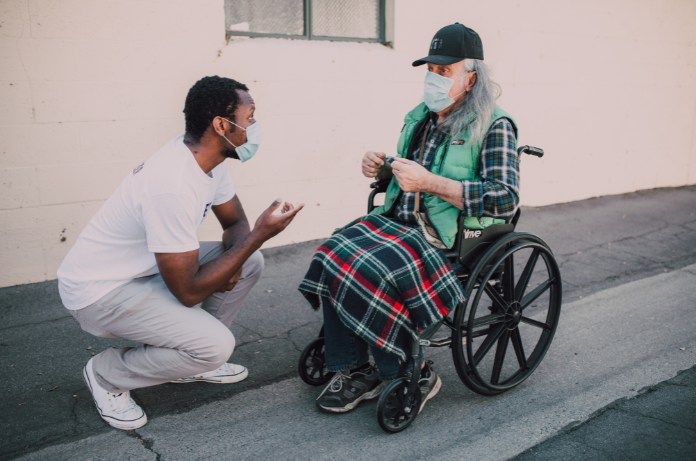In a world that often feels fast-paced and disconnected, small acts of kindness have a way of grounding us, reminding us of our shared humanity. It’s surprising how often being kind not only brightens someone else’s day but also has a profound impact on our own well-being.
Whether it’s holding the door for a stranger or offering a listening ear! These moments often rebound to us in quite surprising and unexpected ways. As the designer of Coco Chanel famously said, “Being kind never goes out of fashion”.
And she was right, kindness doesn’t just make life easier for others; it makes things better for us, too—physically, emotionally, and psychologically.
Let’s explore the fascinating psychology behind kindness, and how these small and free gestures can ripple outward, creating positivity in humankind.

What is the science behind kindness?
The science behind kindness goes deeper than we might even imagine or just think in the first. At the heart of it is a hormone called “oxytocin”, often referred to as the “love hormone.” Oxytocin is released during moments of connection—whether it’s a hug, a kind word, or vouching or even just a thoughtful gesture. It’s what makes us feel closer to others, promoting trust, empathy, and bonding.
When we’re kind, oxytocin levels rise, which not only makes us feel good but also positive impact on our body, feel trusted, reduces stress, and lowers blood pressure. Essentially, kindness triggers a positive chain reaction in our bodies, reminding us that being kind is as beneficial for us as it is for those on the receiving end. Kindness also has a direct effect on the production of serotonin, a neurotransmitter often referred to as the “feel-good chemical” that carries messages between nerve cells in the brain and throughout our body. Serotonin plays a key role in regulating mood, composed, healing, and happiness.
For example, when you help someone in need or offer a simple compliment, your body rewards you with a serotonin boost, lifting your spirits and reinforcing that positive behavior. The more we practice kindness, the more our happiness and sense of well-being develop, ultimately leading to a longer, fulfilling, and satisfying experience. In the era of artificial intelligence which is playing a pivotal role in the daily routine of humankind, when the world can feel overwhelming, it’s important to remember saying “live and let live” —kindness makes the difference, for others and indeed repels on us too.
The role of empathy and social connection in being kind
At its heart, empathy is about stepping into someone else’s shoes, and truly seeing the world from their perspective. Not and never just about feeling sympathy but actively listening and making an effort to understand the emotions and experiences of others. This ability to empathize paves the way for genuine compassion and kindness, creating a sense of solidarity that strengthens our bonds with those around us. As Brené Brown once said, “Empathy is feeling with people.”
It’s this connection that not only enhances personal relationships but also plays a crucial role in the larger social dynamics we live day in and day out and every day. Whether we are interacting with loved ones, building friendships, or engaging in professional setups! empathy is the compass that guides us toward more meaningful and compassionate connections. In this way, empathy and kindness are intertwined, with each one fueling and amplifying the other.
Kindness is a cornerstone of healthy relationships, simplifying interactions and strengthening the bonds we share with others. When we practice kindness, we create a sense of belonging that develops deeper connections and promotes community. These feelings of inclusion and unity are crucial for our social well-being, offering support and comfort in times of need. Acts of kindness, no matter how small, help nurture trust and mutual respect, making our relationships more resilient. When empathy guides these actions, kindness becomes even more meaningful, allowing us to connect on a deeper, emotional level.
Practical ways to cultivate kindness and empathy in everyday interactions
We often underestimate the impact that small differences in our daily interactions can have on our overall well-being. These seemingly minor acts of kindness and empathy can create significant shifts in our emotional landscape, fostering a greater sense of contentment and satisfaction in life. By intentionally incorporating small, thoughtful gestures into our routines, we not only enhance our happiness but also contribute to a more positive and supportive environment for those around us.

-
Recent and real-life examples of kindness
There are billions of real-life examples of kindness but a recent and vetted real-life example of kindness is a Hyderabad boy scouting for saving 200 lives. While millions of people building businesses with AI and making use of AI to build something new and innovative, there is this young kind-hearted lad named Jasper Paul, running 3 shelters, providing shelter for over 200 senior citizens and helping them meet their daily bread needs and helping them find solutions for their healthcare problems. This big gesture of kindness has made 200 souls feel satisfied if not completed. He is just making things possible with kindness for senior citizens who are left unprivileged even after 20,000 days of life.
Sometimes, being the first to show kindness can set a positive tone in social situations. When you practice small, everyday acts of kindness—like offering help, showing patience, or being polite—you encourage others to do the same without needing to point it out.
-
Give Genuine Compliments
Instead of generic praise, focus on thoughtful compliments that show you’ve really paid attention to the person. A compliment like “I really admire how you handled that situation” shows empathy and makes people feel valued.
-
Be Present and Available
In social situations, practice being fully present with the people you’re talking to. Put your phone away, make eye contact, and truly engage in the conversation. Look for subtle ways to assist them without making a big deal about it. Whether it’s cleaning up after a group event or helping a coworker without taking credit, this fosters kindness without creating any pressure for recognition. This creates a sense of empathy by showing that you value social connections.
-
Be Mindful of Small Gestures
Something as simple as holding the door, offering a smile, or giving someone your full attention when they’re speaking can go a long way. These small acts build a foundation of kindness and warmth in any interaction.
-
Acknowledge Others’ Efforts
People often feel overlooked in social situations. Take the time to acknowledge someone’s effort, whether it’s something small like organizing an event or lending a hand. This helps them feel appreciated and fosters a culture of kindness.
-
Check-In on People
If someone seems quieter or more distant than usual, take the time to check in with them privately. This simple act of concern can mean a lot and creates an opportunity for deeper, empathetic connections.
-
Give People the Benefit of the Doubt
In stressful or tense social situations, practice giving others the benefit of the doubt instead of reacting with frustration. This mindset helps foster empathy by encouraging understanding rather than quick judgment.
By incorporating these simple strategies, and great learnings from our real-life examples into our daily lives, we can spark a chain reaction of kindness and empathy that enriches our relationships and communities. Small gestures often lead to big changes, reminding us that every act of kindness counts. As we embrace these practices, we not only uplift those around us but also create a more compassionate world for ourselves. In the end, it’s these little efforts that can transform our shared experiences and deepen our connections with one another.

